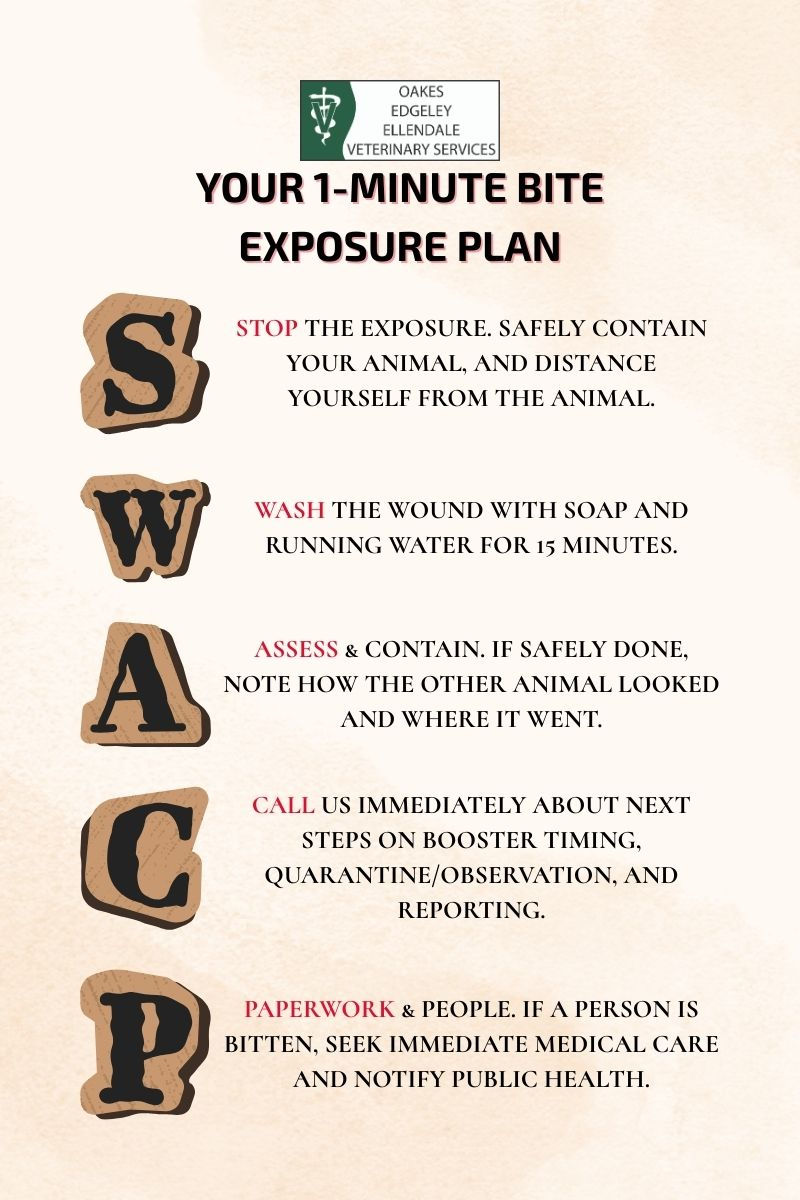World Rabies Day: Your Quick Guide to Bites, Vaccines & Peace of Mind
- Elle Reyes
- Sep 26, 2025
- 3 min read

September 28 is World Rabies Day—an excellent opportunity to assess how protected your pet is and review what to do in the event of a bite or suspicious exposure. Rabies is 100 percent preventable through vaccination, and after the onset of symptoms, it is nearly always lethal. Let's work together to keep your pets—and our communities—safe.
Why it matters here
In North Dakota, rabies vectors include wild bats, skunks, and foxes. Outdoor domestic cats, dogs who are outside, and pet cats and dogs with curious behaviors can be exposed to these wildlife, sometimes without the owner even knowing it. The best plan is straightforward: vaccinate on schedule, limit wildlife exposure, and be prompt in your behavior following a bite.
5 Quick Myth-Busters
Myth #1: “Indoor pets do not need rabies shots.”
Fact: Indoor pets can still occasionally escape or may have contact with a bat brought home by another pet, or may even be a flying animal that entered the home.
Myth #2: “I’ll wait until I see symptoms.”
Fact: Do not do this. Once symptoms develop, rabies is almost always fatal. Prevention is the only cure.
Myth #3: “A small nip is not too serious.”
Fact: Any bite or scratch that breaks skin must be treated. Any exposure to saliva with open skin or the eyes is included.
Myth #4: “Only dogs get rabies.”
Fact: Any mammal can get rabies, including cats, dogs, ferrets, cows, and you.
Myth #5: “Wildlife that looks friendly is fine.”
Fact: If a wild animal appears unusually tame or is active during the daytime when it should be nocturnal, that is a warning. Do not approach.

Vaccination: What Does "Up-to-Date" Mean?
Puppies & Kittens:
The first rabies vaccine at the age your veterinarian recommends (typically 12-16 weeks), then a one-year booster.
Adults:
Boosters, according to the vaccine label (1- or 3-year), taking into account your pet's history or local regulations.
Cats:
No exceptions! Even indoor cats need a rabies vaccine. Barn cats and mousers are at higher risk - don't skip!
We will review your pet's record, recommend the appropriate interval, and provide you with a signed certificate for your files.
Reduce Risk at Home
Wildlife-proof your property:
Remove food, secure trash cans, close holes in barns and sheds, and feed pets indoors.
Supervise time outdoors:
Use leashes on dogs; cats should stay indoors.
Do not handle unknown animals:
Teach children to avoid touching wildlife and unfamiliar animals.
Report stray or suspicious wildlife to animal control or the local authority.
When you should contact us ASAP
Your pet has bitten or scratched a person.
Your pet has been bitten or scratched, or found with saliva from an unknown or wild animal.
You've found a bat in your house, especially if someone was sleeping in that room.
Your pet is due for a rabies booster, or you are unsure of their status.
What to Expect at Our Clinic
Gentle, non-stressful visits for cats and dogs.
Record review and a clear plan for boosters and due dates.
Certificates and reminders so you don't miss the next one.
Whole-pet care: we can update other core vaccines and parasite prevention at the same visit.
Prepared to protect your pet?
World Rabies Day is the best reminder. If your pet is due (or you don't know), book a quick vaccine appointment. We serve families in Edgeley, Oakes, Ellendale, and the surrounding rural communities. Let's keep your pets—and our neighbors—safe.





Comments